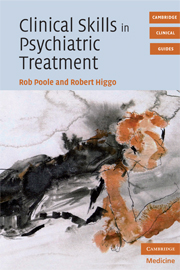Book contents
- Frontmatter
- Contents
- Acknowledgments
- Author biographies
- Introduction
- PART I UNDERLYING PRINCIPLES
- 1 Starting points
- 2 A triangle of forces
- 3 Treatment objectives
- 4 Strategic treatment
- PART II THE CONTEXT AND LOCATION OF TREATMENT
- PART III PROBLEMS IN TREATMENT
- PART IV COPING
- Afterword: Optimism of the will and pessimism of the intellect
- References
- Index
1 - Starting points
from PART I - UNDERLYING PRINCIPLES
Published online by Cambridge University Press: 08 August 2009
- Frontmatter
- Contents
- Acknowledgments
- Author biographies
- Introduction
- PART I UNDERLYING PRINCIPLES
- 1 Starting points
- 2 A triangle of forces
- 3 Treatment objectives
- 4 Strategic treatment
- PART II THE CONTEXT AND LOCATION OF TREATMENT
- PART III PROBLEMS IN TREATMENT
- PART IV COPING
- Afterword: Optimism of the will and pessimism of the intellect
- References
- Index
Summary
In 1981 a house physician sat on the bus on the way to work and opened the latest edition of the British Medical Journal. He was about to start training as a psychiatrist, so he was interested to find an editorial entitled ‘The new psychiatry’ (Anon., 1981). Recent research seemed to indicate that people with depressive illnesses showed neuroendocrine abnormalities that varied according to the type of depression that they were suffering from. The author was confident that in the future the use of specific and scientific tests, such as the dexamethasone suppression test, would allow more objective diagnosis of serious depression and better selection of treatment. Further research could be expected to lead to a variety of methods of measuring the physiological disturbances associated with mental illness. In the future psychiatric diagnosis would be less reliant on subjective judgements based on talking to patients. Psychiatrists, it seemed, could leave the periphery of medicine, don their white coats and enter the mainstream of the profession.
The young doctor was disheartened. He was drawn to psychiatry precisely because it involved close contact with patients and demanded a thorough understanding of their lives. The process of trying to understand patients and their problems in terms of test results and hormone assays was exactly what he disliked about general hospital medicine. His knowledge of psychiatry was absolutely rudimentary, but he was puzzled that anyone could suggest that people suffering from mental illness could be helped by a purely technological process.
- Type
- Chapter
- Information
- Clinical Skills in Psychiatric Treatment , pp. 7 - 12Publisher: Cambridge University PressPrint publication year: 2008

